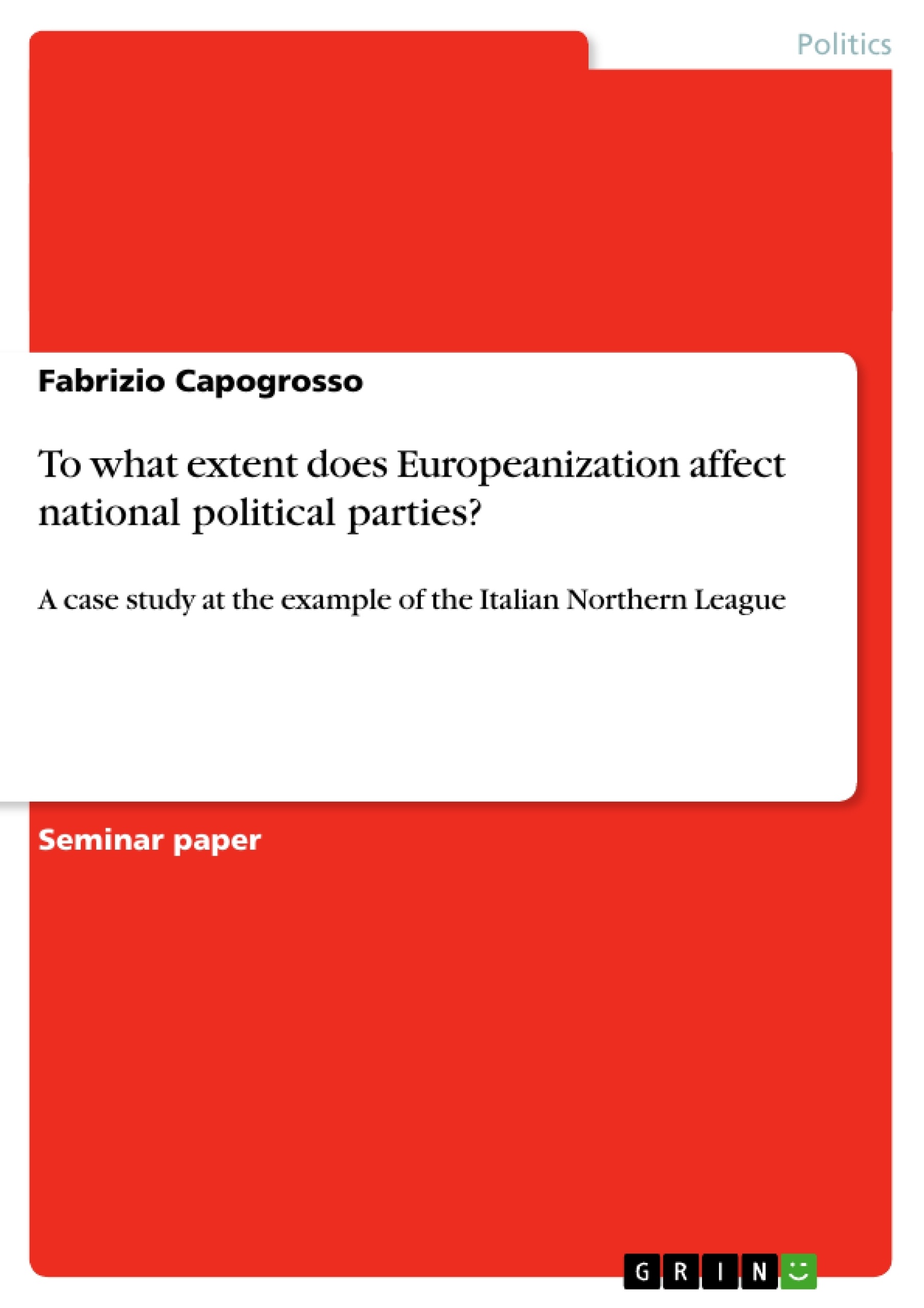The aim of the following paper is to analyse to which extent Europeanisation affects national parties at the example of the Italian “Northern League”, and to examine to which degree the impact of European integration has led to an organisational adaptation within the party. The analysis will be based on a set of hypotheses derived from recent research on the topic (cf. Carter et al. 2007, Poguntke et al. 2007).
In the first part, I will provide a theoretical background on the meaning of “Europeanisation” (chapter 2.1), on its significance for the Italian government system (chapter 2.2) and on its implication for national parties (chapter 2.3) in order to conceptualise the use of the term in the present paper. Subsequently, I will briefly describe the principal features of the party chosen for the case study with reference to its origin, development, electoral evolution, organisation and political discourse (chapter 3). In the fourth chapter, I will come to the analysis of the programmatic and organisational change of the party, examining its stance towards the European Union, the role of party leadership and EU-specialists, and the significance of collateral organisations.
In the conclusion, I will summarize the findings of the analysis to discuss the viability of the hypotheses. After all, I will try to offer an outlook concerning the principal problems encountered during the analysis and offering consequently a critical evaluation on the sense of Europeanization of national political parties as a new research agenda.
Inhaltsverzeichnis (Table of Contents)
- 1. Introduction
- 1.1 Structure and aim of the paper
- 1.2 Hypotheses and analytical framework
- 2. Theoretical background
- 2.1 Europeanisation: meanings and dimensions
- 2.2 Europeanisation and Italy
- 2.3 Europeanisation and national parties
- 3. The Italian "Lega Nord"
- 3.1 Origins, development and electoral evolution
- 3.2 Party organisation and political discourse
- 4. Analysis of the case study
- 4.1 Programmatic change
- 4.2 Organisational change
Zielsetzung und Themenschwerpunkte (Objectives and Key Themes)
This paper aims to analyze the extent to which Europeanization affects national parties, using the Italian "Lega Nord" as a case study. It examines how European integration has led to organizational adaptation within the party. The analysis is based on hypotheses derived from existing research on the topic.
- The impact of European integration on national parties.
- The role of party elites and EU specialists in adapting to Europeanization.
- Programmatic and organizational changes within the Lega Nord in response to European integration.
- The relationship between the Lega Nord's position within government coalitions and its anti-system rhetoric.
- The implications of Europeanization for the political strategies of ethnoregionalist parties.
Zusammenfassung der Kapitel (Chapter Summaries)
Chapter 1: Introduction introduces the research question and outlines the paper's structure. It highlights the limited research on the Europeanization of national parties and presents three key hypotheses to be tested.
Chapter 2: Theoretical Background discusses the concept of "Europeanization," its impact on the Italian government system, and its implications for national parties. It provides a theoretical framework for analyzing the case study.
Chapter 3: The Italian "Lega Nord" provides background information on the Lega Nord, including its origins, development, electoral performance, organization, and political discourse.
Chapter 4: Analysis of the Case Study examines the programmatic and organizational changes within the Lega Nord. This section will analyze the party’s stance towards the European Union, the roles of party leadership and EU specialists, and the significance of collateral organizations.
Schlüsselwörter (Keywords)
Europeanization, national parties, Lega Nord, Italian politics, party adaptation, programmatic change, organizational change, party elites, EU specialists, ethnoregionalism, populism, European integration.
Frequently Asked Questions
How does Europeanization affect national political parties?
Europeanization affects national parties by forcing programmatic changes and organizational adaptations. Parties must develop stances on EU policies and often empower internal specialists to handle European integration issues.
What is the "Lega Nord" and how did it respond to the EU?
The Lega Nord is an Italian ethnoregionalist and populist party. The case study examines how it shifted its political discourse and organization in response to Italy's integration into the European Union.
Do party leaders gain more power through Europeanization?
Yes, one hypothesis is that European integration tends to strengthen the role of party elites and EU specialists, as they control the complex information and negotiation processes at the European level.
What is "programmatic change" in this context?
Programmatic change refers to how a party adjusts its official platform and rhetoric to include or oppose European topics, often balancing anti-system rhetoric with the practicalities of being in a government coalition.
Why is Europeanization of parties a new research agenda?
Traditionally, research focused on the EU's impact on governments. Analyzing its impact on the internal life and strategies of political parties is a more recent development in political science.
- Arbeit zitieren
- M.A. Fabrizio Capogrosso (Autor:in), 2008, To what extent does Europeanization affect national political parties?, München, GRIN Verlag, https://www.grin.com/document/121626



